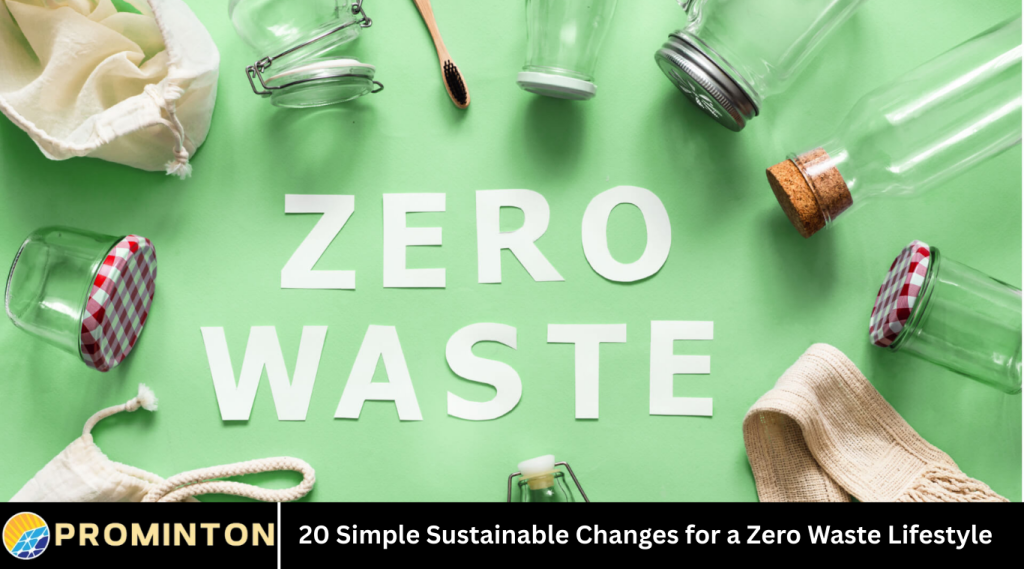Many people today want to live in a way that helps protect the environment. One way to do this is by adopting a zero waste lifestyle. This means trying to create as little trash as possible by making better choices in our daily lives.
Living zero waste may sound difficult, but small changes can make a big difference. This article shares 20 simple and easy changes you can make to live more sustainably and reduce waste. These changes are easy to add to your everyday life and help protect our planet for the future.
Why Choose a Zero Waste Lifestyle?
Choosing to live a zero waste lifestyle is important because waste, especially plastic and non-recyclable materials, harms the environment. It pollutes land, water, and air and affects animals and humans. By creating less waste, you reduce pollution, save resources, and help conserve energy. Zero waste living also encourages reusing, recycling, and buying less, which are good habits for both the planet and your wallet.
Simple Sustainable Changes to Start Today
Switch to Reusable Bags
Instead of using plastic bags, carry reusable bags when you shop. These bags last longer and reduce the number of plastic bags that end up in landfills or oceans.
Use a Reusable Water Bottle
Plastic water bottles create a lot of waste. Using a reusable water bottle helps you avoid buying bottled water and reduces plastic pollution.
Bring Your Own Coffee Cup
Many coffee shops offer discounts if you bring your own cup. This simple change can cut down on disposable cups and lids.
Choose Products with Less Packaging
When shopping, look for items with little or no plastic packaging. Buying in bulk or choosing loose fruits and vegetables can reduce waste.
Use Cloth Instead of Paper Towels
Replace paper towels with washable cloth towels. They can be used many times and help reduce paper waste.
Avoid Single-Use Plastics
Items like straws, cutlery, and plates are often used once and thrown away. Choose reusable or biodegradable options instead.
Compost Food Scraps
Instead of throwing food scraps in the trash, compost them. Composting turns food waste into useful soil for gardens.
Buy Secondhand Items
Buying used clothes, furniture, or electronics gives items a second life and reduces demand for new products.
Repair Instead of Replace
When something breaks, try to fix it instead of throwing it away. Repairing saves money and reduces waste.
Use Bar Soap Instead of Liquid Soap
Bar soaps usually come without plastic bottles and last longer, helping reduce plastic waste.
Switch to Reusable Menstrual Products
Products like menstrual cups or cloth pads create less waste compared to disposable products.
Use Refillable Cleaning Products
Many stores offer refill stations for cleaning products. Bring your own containers and refill to avoid buying new plastic bottles.
Grow Your Own Food
Even a small garden or a few pots can help reduce packaging waste from store-bought produce.
Avoid Fast Fashion
Buy clothes that last longer and avoid buying many cheap items that quickly wear out and get thrown away.
Use a Cloth Produce Bag
Instead of plastic bags for fruits and vegetables, use cloth produce bags that you can wash and reuse.
Choose Bulk Toiletries
Buy shampoo, conditioner, and soap in bulk or solid bars to reduce plastic packaging waste.
Use Beeswax Wraps Instead of Plastic Wrap
Beeswax wraps are reusable and keep food fresh without creating plastic waste.
Switch to Rechargeable Batteries
Rechargeable batteries reduce the number of batteries thrown away and save money in the long run.
Carry Your Own Cutlery Set
Bring your own metal or bamboo cutlery when eating out or ordering takeout to avoid disposable plastic cutlery.
Donate or Recycle Properly
When you no longer need something, donate it or recycle it properly instead of throwing it in the trash.
Frequently Asked Questions
What is a zero waste lifestyle?
A zero waste lifestyle is a way of living that aims to create as little trash as possible by reducing, reusing, recycling, and composting.
Why is zero waste important?
Zero waste helps reduce pollution, conserve natural resources, save energy, and protect animals and ecosystems from harm caused by trash.
How can I start living zero waste?
Start with small changes like using reusable bags and bottles, avoiding single-use plastics, and composting food scraps.
Is zero waste lifestyle expensive?
It can save money over time because you buy fewer disposable products and reuse items. Some reusable products may cost more upfront but last longer.
What if I can’t avoid all plastic?
Try to reduce plastic use as much as possible. Choose alternatives like glass, metal, or biodegradable materials when you can.
How do I compost at home?
You can compost food scraps in a bin or pile in your backyard, or use special compost bins if you live in an apartment.
Can zero waste lifestyle be hard in some places?
Some areas may have fewer options, but you can still make small changes and encourage your community to support zero waste habits.
Conclusion
Living a zero waste lifestyle may seem challenging at first, but making small, simple changes can add up to a big difference. These 20 sustainable swaps are easy to start and help reduce the amount of waste we create every day. By choosing reusable, repairing items, composting, and buying wisely, you protect the environment and create a healthier future for everyone. Start with one or two changes and gradually include more. Every small step counts toward a cleaner and greener planet.



